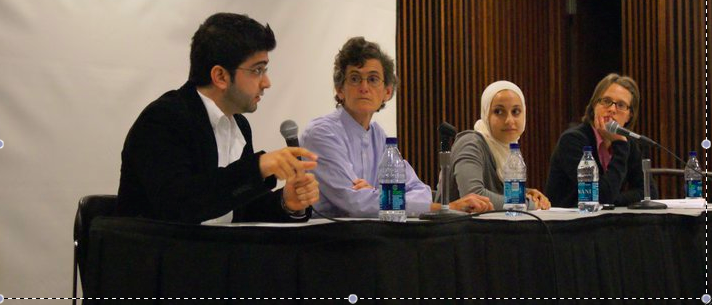From left to right: Nail Albarghouthi, Sylvia Schwarz, Susie Gad, and Susanne Waldorf. Photo by Amber Michel
150 students recently attended a panel discussion coordinated by the group, Students for a Free Palestine, at Saint Cloud State University. The four panelists were all members of MN BBC, but each came with a different perspective. The following article by Anazthasya Anthony published in the the University Chronicle of St Cloud State on October 24, 2010 relays more of the story:
On Tuesday, Atwood Little Theatre came to life when students, faculty, and the public engaged with a panel about Israeli-Palestinian issues. Students for a Free Palestine hosted a discussion containing history, personal stories, resistance, and legal violations in Palestine. The panel consisted of speakers, Sylvia Schwartz, Nail Albarghouthi, Susie Gad, and Susanne Waldorf.
Schwarz, a Jewish American, spoke about her childhood memory and what brought her Palestinian solidarity. “We learned in my Sunday school that Israel had the most moral army in the world,” Schwarz said. In 1982, she said she began having doubts, “Suddenly I was aware that I had been lied to.”
Albarghouthi, SCSU student and president of Students for a Free Palestine, shared his view.
“As a child, I had a lot of questions why was I born in Kuwait, raised in Jordan and living in the U.S.,” Albarghouthi said. He also said he was curious why he could not return to his home country, Palestine.
Zionism, Albarghouthi said, is a European colonial movement formed to relocate European Jews in Palestine. “The real problem is the Zionists and the Zionists’ ideology,” Albarghouhi said.
Gad, the third panel speaker, related how the Israel-Palestine conflict was a blur to her until 2006. “Everything was background noise,” Gad, an Egyptian American said. In 2006, while on her study abroad program in Egypt, she and her friends decided to visit Jerusalem.
“My fiancée and I were of Arab descent and we realized right away how drastically different we were treated,” Gad said. The guards at the checkpoint held them for more than seven hours because they were assumed to be Palestinians. She enlightened the crowd on Israel’s legal violations despite stipulations in International Law. “I learned that international law was to ensure that Palestinians received equal civil rights, human rights, political rights, cultural rights, social rights,” Gad said.
The audience learned about various organizations combating oppression of the Palestinians, including Minnesota Break the Bonds Campaign through Waldorf. “For some reason, we are invested in Israeli bonds and we are asking the State to divest,” Waldorf said.
One question raised was the position of the U.S. in the conflict. “Israel is the largest recipient of U.S. foreign aid, and a lot of aids are given in forms of grants for Israel to purchase U.S. weapons,” Waldorf said.
When asked about a resolution idea, Albarghouthi stressed the importance of education. “The more educated the general public is, the more they can pressure their government to act upon it,” he said.
Albarghouthi told the crowd about proposed the two-state solution where Palestinians and Israel will be given rights to their own land. “To me, no matter how many states we want to slice it into, giving people their rights, their bite to eat, will reduce the conflict at least by 80 percent,” Albarghouthi said.
Farzona Dzhabbarova, an SCSU student at the event said,“This event taught me even more than I expected.”
Students for a Free Palestine is a relatively new student organization established last March. “The panel is at times much more effective than showing a film, where the conflict is distant, the people involved are distant, and therefore doesn’t hit home,” Albarghouthi added.

